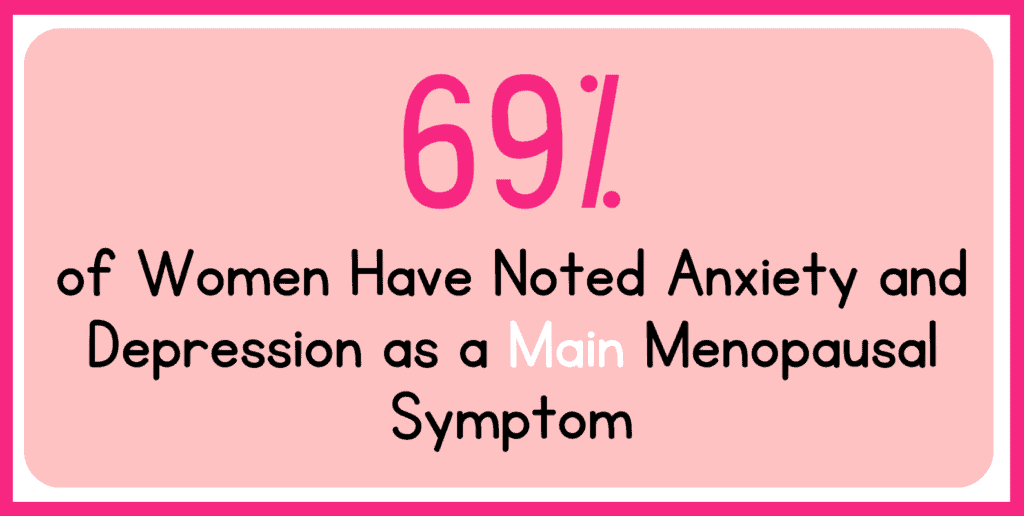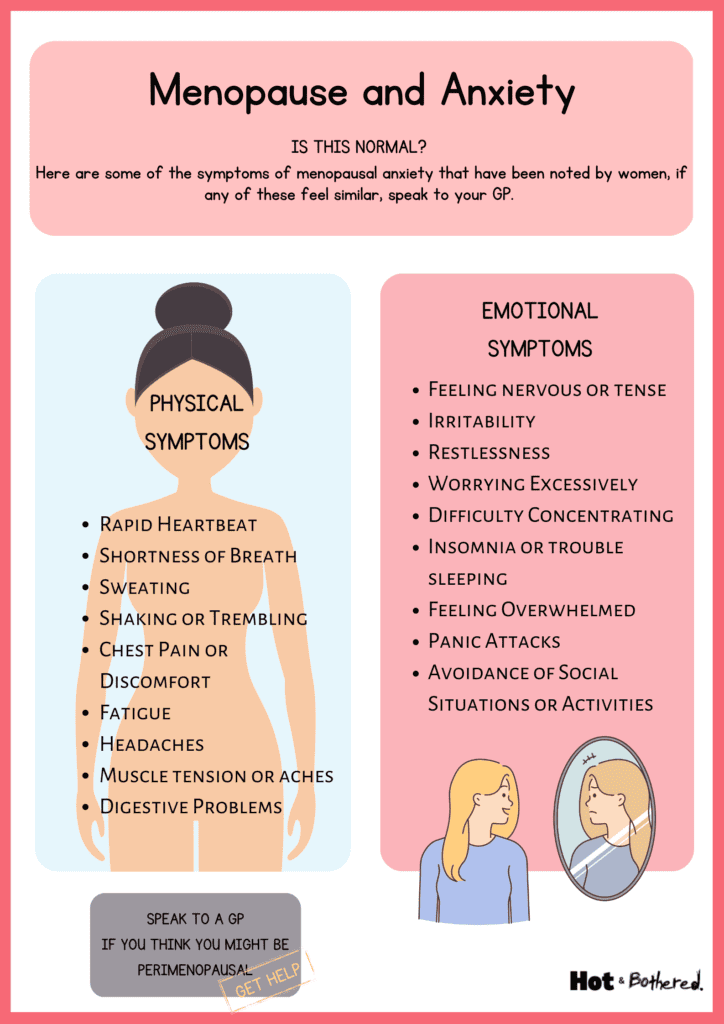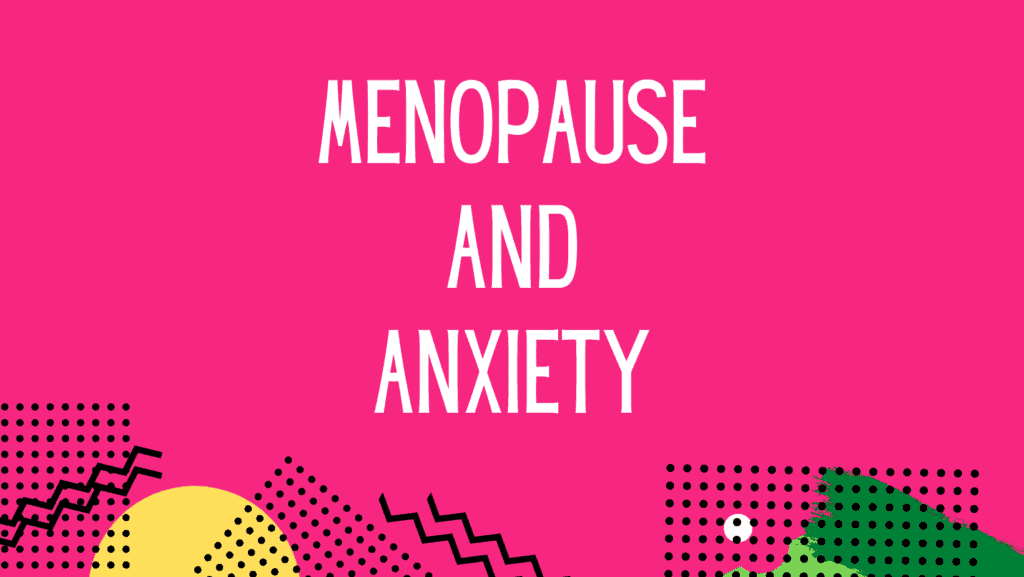OK let’s talk about menopause and anxiety.
This was easily the most debilitating symptom I had (and sometimes still have) Anxiety shows up in so many different ways and it takes no prisoners.
This can show up as a general unease, a weird feeling of dread, suddenly fear of things you were not afraid of and the list goes on.
These feelings can arrive like a bolt of lightning or creep up on you like a rotten little bully slowly picking away at your self-confidence.
Please know I thought I had lost my mind, was ready to call in the large butterfly nets and call it quits but there is light at the end of the tunnel I promise.

Right, let’s get into the weeds:
Understanding the causes and symptoms of menopause-related anxiety is crucial to managing it effectively.
Menopause and Anxiety – What You Need to Know
What is menopause anxiety?
Menopause anxiety is a type of anxiety that occurs during menopause. It is a feeling of unease, fear, or worry that can be mild or severe and might interfere with daily activities.
Menopause anxiety can be caused by a variety of factors, including hormonal changes, physical symptoms, and psychological factors such as stress, depression, and life changes.
I mention psychological factors because the hormones are having a hissy fit but stress and its friends above will not help and could cause anxiety to rear its ugly head.
Check out my symptom checker for other symptoms.
Here are some examples of what I experienced with anxiety:
- Sudden fear of driving at night
- Convinced something bad was going to happen to the kids
- A feeling of dread when I woke up
- Thinking everyone was mad at me for some reason
- Feeling utterly inadequate at work and avoiding all work-related events
- Tearful
- Just flat, so very very flat
- So tired that I would a nap every afternoon
- Certain that my partner was going to leave me for a young, hot, long-legged goddess
What causes menopause and anxiety?
The hormonal changes that occur during menopause can trigger anxiety in some women.
Fluctuating levels of Estrogen and progesterone can affect the neurotransmitters in the brain that regulate mood and anxiety.
Physical symptoms such as hot flushes, sleep disturbances, and night sweats can also contribute to anxiety. Let’s be honest, not getting a good night’s sleep can push most of us into thinking we are losing our minds.
Remember falling Estrogen levels are NOT your fault, therefore your anxiety during menopause cannot be helped, please remember that when thinking about what causes menopause anxiety. Be kind to yourself.
How common are menopause and anxiety?
Menopause and anxiety are common experiences among women.
It is estimated that up to 70% of women experience some form of anxiety during menopause.
However, the severity and duration of anxiety can vary greatly among women.
It is essential to seek professional help if menopause anxiety begins to interfere with daily activities or significantly impacts the quality of life. I waited far too long to do this.
If you think you are not coping as you did before, this could be anxiety and you have not twigged yet.
We, women, have a tendency to “get on with it” and assume this too shall pass. But it doesn’t. It can get worse and you need to pay attention to what is happening in your life.
If it all feels too much, that is because it is. But there is help out there and it can make a HUGE difference.
I am on HRT, this is what works for me, and I can honestly say I no longer fear the long-legged goddess and driving at night is a pleasure, well, mostly.
Signs and symptoms of menopause anxiety
What does hormonal anxiety feel like?
Not everyone will experience these symptoms but I think you should know about the most common anxiety symptoms that women going through Perimenopause and Menopause have noted.

9 Physical symptoms of menopause anxiety:
- Rapid heartbeat
- Shortness of breath
- Sweating
- Shaking or trembling
- Chest pain or discomfort
- Fatigue
- Headaches
- Muscle tension or aches
- Digestive problems, such as nausea or diarrhoea
9 Emotional symptoms of menopause anxiety:
- Feeling nervous or tense
- Irritability
- Restlessness
- Worrying excessively
- Difficulty concentrating
- Insomnia or trouble sleeping
- Feeling overwhelmed
- Panic attacks
- Avoidance of social situations or activities
It is important to note that not all women experience the same symptoms of menopause anxiety.
Some women may experience more physical symptoms, while others may have more emotional symptoms. I had a vile mix of both which I can say is now under control but as I have already said, anxiety reigned supreme.
How to Manage Menopause Anxiety
OK, I will always be honest, HRT is what removed 95% of my symptoms.
If you want to know what symptoms I went through, along with the rest of the documented symptoms, take a look at the symptom checker.
There are recommendations out there that people have said might just help and I wanted to share them with you.
Lifestyle changes to manage menopause anxiety:
- Regular exercise can help reduce anxiety and improve mood so let’s get those bodies moving and see if it helps.
- A healthy diet that includes whole grains, fruits, vegetables, and lean proteins can help balance hormones and reduce anxiety but when you feel crap it is often hard to find the energy to make a nutritious meal. There are loads of hints and tips on the internet for shortcuts to make this easier for you.
- Limiting caffeine and alcohol can help reduce anxiety symptoms. I personally know that alcohol makes my anxiety ten times worse the next day so I have cut WAY back until I feel like I am in control of this menopause anxiety.
- Getting enough sleep is essential. Not much else to say on this one. We need our beauty rest ladies.
Relaxation techniques to manage menopause anxiety:
- Meditation and mindfulness practices can help. Meditation is something I have used to combat stress for many years and it really does have the desired effect for me.
- Deep breathing exercises can help calm the mind and reduce physical symptoms of anxiety. I use this one with my son who has anxiety, and it really works. Again there are so many videos out there on YouTube to help with breathing practices. Go check some out.
- Yoga and tai chi can help reduce anxiety and improve overall well-being. I have never done Yoga but always thought about it. If any of you can feedback on this, let me know.
Counselling and therapy to manage menopause anxiety:
- Cognitive-Behavioral Therapy (CBT) can help change negative thought patterns that contribute to anxiety. I had CBT after I had my second son. I suffered from postnatal depression and at the time I didn’t want antidepressants so I tried them. It really was a lifesaver for me.
- Counselling. One-to-one talking therapy to help with the anxiety.
- Group therapy or support groups can provide a safe space to share experiences and receive support from others going through similar experiences
Hormone Replacement Therapy:
- HRT is a safe and effective way of treating menopause anxiety and is something to consider alongside the above suggestions. Speak to your GP and get all the details to make an informed decision. Maybe boosting that Oestrogen is the way to go.
How can I stop menopause anxiety?
There is no single solution to stop menopause anxiety, I really wish there was.
Treatment may depend on the severity of symptoms and an individual’s health history.
Some of the suggestions above may help but my default response will always be to speak to your GP. Find a great GP who is a menopause or perimenopause specialist and tell them EVERYTHING.
I remember feeling so daft saying I was afraid of driving in the dark but I didn’t care, finding a solution to it all meant so much more to me than looking like a fool.
Does menopause anxiety go away?
Menopause anxiety may lessen or go away on its own over time, but it can persist for several years. SEVERAL YEARS LADIES.
It is essential to seek professional help if menopause anxiety begins to interfere with daily activities or significantly impacts the quality of life.
But here is my answer to this question, based solely on my experience with HRT.
If you take a look at my anxiety symptoms above you will see I was a mess, it was easily the most confusing time of my life and those symptoms went up in a puff of smoke within a week of being on HRT.
They just went away, now this might not happen to everyone but this was my experience. The anxiety reduced to almost nothing and I really started to feel a bit more like myself.
I don’t know how else to describe it. I had not seen this girl for such a long time, it was emotional being back and seeing in the rearview mirror what I had been through. So for me, menopause anxiety really can go away.
Will HRT help with anxiety?
Yes. You can 100% combat menopausal anxiety with HRT (take a look at the above question)
There are many things that you need to take into consideration with your GP, they are experts at this.
They will look at all the different types and see what dose might be right for you, your medical history and the severity of your symptoms. It may take a few goes to get things right but it will be worth the effort.
Estrogen comes as:
- skin patches
- a gel or spray to put on the skin
- implants
- tablets
If you are still having periods you may need Progesterone too, there are so many different things to consider but it is always worth finding out as much as you can so you can make an informed decision.
Speak to your doctor and get them to walk you through it all. There is light at the end of the tunnel.
Closing Thoughts
In conclusion, menopause anxiety can be a real bitch of a symptom to manage. It is essential to understand that it is a normal part of the menopausal transition, and many women experience it.
Some lifestyle changes, relaxation techniques, counselling, or therapy can help manage menopause anxiety.
Medication, including Hormone Replacement Therapy (HRT) or non-hormonal medications, can also be an effective treatment for reducing menopause-related anxiety.
It is important to seek professional help if anxiety symptoms become too severe and begin to interfere with daily activities.
Remember, you do not have to suffer alone, and there are many options available to help manage menopause anxiety.
Overall, it is crucial to take care of your mental and physical health during menopause. By understanding menopause anxiety and seeking the appropriate treatment, you can improve your quality of life and enjoy this new phase of your life.
Because let’s be honest, we really can’t spend years feeling shitty for no reason. There are many ways to help get through this and YES it can still be menopause in your late 30s and early 40s.
Kathryn x
Disclaimer: I am not a medical professional, herbal or physical therapist, and I am not educated in the menopause space. All opinions expressed on this blog are my own and should not be taken as medical advice. This blog is intended to share my personal experiences and insights, and should not be used as a substitute for professional advice. Please consult a qualified medical professional, herbal or physical therapist for any health-related concerns. Additionally, I strive to keep things light and entertaining, but please keep in mind that the topics discussed on this blog may be sensitive or triggering for some readers.
Get Your Free Perimenopause Symptom Checker
Thank you!
Your symptom checker is on its way to you!
